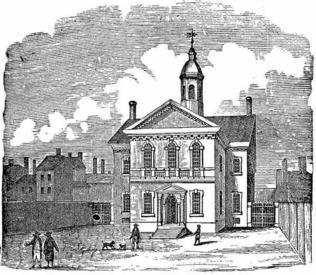[Joseph Warren in Boston to Samuel Adams at Philadelphia]
Date: September 29, 1774
Dear Sir, – My last letter of the 26th instant you will doubtless have received by the post before this reached you. Since then, there have been arrivals from England, by which we learn that the ministry are still inflexible and obstinate. The consequence then is, that, if America sees better days, it must be the result of her own conduct. The fortifications on Boston Neck are carried on without intermission. The troops are availing themselves of every opportunity to make themselves more formidable, and render the people less able to oppose them. They keep a constant search for every thing which will be serviceable in battle; and whenever they espy any instruments which may serve or disserve them, -whether they are the property of individuals or the public is immaterial, – they are seized, and carried into the camp or on board the ships of war. Mr. Joseph Scott, of this town, has sold them a number of shells, cow horns, chain shot, &c., to the amount of £500 sterling; and yesterday, about noon, they were carried on board one of the ships. The people are enraged against Mr. Scott, and he keeps incog. About two hundred carpenters were employed the last week in providing barracks for the troops. This week the works are entirely forsaken, – a few hands, indeed, are raised from the regiments, but by no means enough to carry on the buildings with expedition.
The employment was profitable to the tradesmen, and drew cash from the king to circulate in this impoverished town; but, in consequence of the proceedings of the committee, they desisted, and discovered a great aversion to do any thing displeasing [to] their brethren in the country, or that could possibly be injurious to the cause of American freedom.
The treatment which the inhabitants receive from the soldiery makes us think that they regard us as enemies rather than as fellow subjects. Some of our warm advocates can hardly brook the many private insults we receive; and, were it not that your august body [i.e. the First Continental Congress] had cautioned us against any engagement with them, I fear bloodshed would have ensued before this.
When they carried the machines from Mr. Scott’s, it made us “tremblingly alive all o’er;” and it is as much as our grave, serious people can effect to keep people from action at some particular times. The determination of the congress is waited with much impatience: that, we expect, will be decisive.
In your letter from England were enclosed two pamphlets; but as I knew you had one of them at Philadelphia, some time ago, and that Dr. Winthrop had sent you the other, I did not think it worth while to burden the carrier with them.
Mr. Samuel Phillips, jun., of Andover, was this day carrying about a dozen fire-arms over Charlestown ferry. The sloop-of-war lying in the river dispatched a boat, and seized them. A load of straw, said to be the property of Major Goldthwait, was this day bringing to town for the use of the soldiers; but the high sons of Roxbury gave it to the flames.
Your worthy family are all well, and would have you informed that they think of you, though they are not with you.
Josiah Quincy, Esq., sailed for London last Monday.
People were so rapacious for the intelligence brought from the congress by Mr. Revere, that I thought myself bound to publish an extract from your letter; and, although it was done without your permission, I know you will forgive it.
Please let Mr. Cushing know, that I should not have published his letter but at the earnest request of a number of our most valuable friends. These publications, I think, you would approve, if you were sensible of the animation they give to our dejected friends.
The inconnection and want of form in this hasty production pleads for its excuse, that Mr. Revere waits for it.
I am, dear sir, with the utmost sincerity, your friend and humble servant,
Joseph Warren.
Source: The original ms is now among the Samuel Adams Papers 1635-1826, In: Wells and Bancroft Collection, New York: New York Public Library. Full text also appears in Richard Frothingham, Life and Times of Joseph Warren. Boston: Little, Brown, & Co., 1865, pp. 381-382. Frothingham judged only the last paragraph and signature to be in Warren’s handwriting. “Trembling alive all o’er” is a quote from Alexander Pope (An Essay on Man. Address’d to a Friend. Dublin: S. Powell, 1733.)
Commentary: Massachusetts Patriots and Governor General Gage’s troops teeter on the edge of open rebellion. In this letter Joseph Warren keeps Samuel Adams and the Massachusetts delegation to the Continental Congress closely informed of thrusts and parries between opposing sides in Boston. The situations have an ominous tone. A Joseph Scott has sold a considerable quantity of munitions to the British Navy and goes into hiding for fear of Patriot retribution. Sons of Liberty in Roxbury commandeer and burn a load of Mr. Goldthwait’s hay intended to supply General Gage’s troops. It is unclear from the this letter the extent to which Joseph Warren is directing versus passively reporting on these events.
Not included in this letter, perhaps too sensitive to commit to writing should the letter fall into Loyalist hands, is the acquisition of four cannon by several high Sons of Liberty and concealment of the artillery right under the occupying soldiers’ noses. Within weeks the Massachusetts Provincial Congress would convene and appoint a secretive Committee of Safety to oversee further Patriot militia preparations.

 Follow
Follow